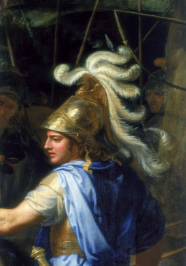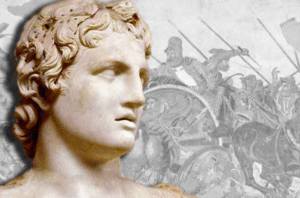Alexander : The Legendary Conqueror

Alexander the Great was born in 356 BCE in Pella, Macedonia (a region in Greece). He became king in 336 BCE after his father, King Philip II, was assassinated. Alexander is famous for creating one of the biggest empires in history, stretching from Greece all the way to India. His life story is full of adventure, battles, and legends, and even today, people are fascinated by his achievements.
Early Life
Alexander was the son of Philip II and Olympias. From a young age, he was taught by the famous philosopher Aristotle. Aristotle inspired him with ideas about philosophy, science, and leadership. As a boy, Alexander showed great courage and intelligence. He fought in battles while still a teenager and was involved in important events in Macedonia.
Becoming King
When his father was killed, Alexander was just 20 years old. The army quickly supported him as king. He took control without much opposition and immediately started planning to expand his empire. He led his troops to conquer neighboring regions and to prepare for a bigger campaign in Persia (modern-day Iran).
Conquering Persia
In 334 BCE, Alexander crossed the Dardanelles (a narrow strait in Turkey) and began his campaign against Persia. His first big victory was at the Battle of the Granicus River. Soon after, he defeated the Persian king Darius III at the Battle of Issus in 333 BCE. This victory opened the way for him to take control of much of Asia Minor (modern-day Turkey).
Moving into Egypt and Beyond
Alexander then moved south into Egypt, where he was welcomed as a hero. He founded the city of Alexandria, which became a major center of learning and culture. He also visited the oracle of Amon in Egypt, where he was told he was the son of a god. This boosted his belief in his divine status.
The Persian Empire Falls
In 331 BCE, Alexander fought and won the Battle of Gaugamela, which was a decisive victory over Darius III. Darius fled, and Alexander took over Persia’s capital, Persepolis. He burned down the palace as a symbol of revenge for Persia’s earlier invasions of Greece. Alexander continued to chase Darius, but the Persian king was eventually killed by his own people.
Eastward Expansion
After Persia, Alexander marched into Central Asia and India. He fought fierce battles along the way, including the famous Battle of the Hydaspes against King Porus. His army was tired and hesitant to go further, so he decided to turn back from India in 326 BCE. Despite his plans to explore and conquer more, his troops refused to continue, and he agreed to return home.
An Empire of Cities and Culture
Alexander founded many new cities, often named Alexandria, which spread Greek culture and ideas across Asia. He wanted to mix Greek and Asian cultures, encouraging marriages between Greeks and locals. However, many of his own soldiers disliked this idea, and tensions grew.
Final Years and Death
In 324 BCE, Alexander returned to Babylon, where he made plans to unite his empire and explore new lands. He declared himself a divine figure, demanding that people worship him as a god, which caused controversy. Sadly, in 323 BCE, at just 32 years old, he fell ill after a banquet and died. The exact cause of his death is still a mystery—some say it was fever, poison, or exhaustion.
What Happened After His Death?

Without a clear heir, his generals fought over his empire. It quickly broke apart into smaller kingdoms ruled by his former commanders, like Ptolemy in Egypt and Seleucus in Persia. These successors continued to spread Greek culture and influence, shaping history for centuries.
Recent Trends & Interesting Facts
- Legacy of Hellenism: Alexander’s conquests spread Greek culture and language across Asia, influencing art, science, and city planning even after his death.
- Modern Interest: Today, scholars and historians are still studying his campaigns, and many movies, books, and documentaries explore his life.
- Archaeological Discoveries: Recent excavations in Egypt, Turkey, and Central Asia continue to uncover artifacts linked to Alexander’s empire.
- Controversial Figure: Some see him as a brilliant general and visionary leader; others criticize his brutality and destruction, especially the destruction of Thebes and Tyre.
FAQs About Alexander the Great
Q1: Was Alexander the Great actually a god?
A: No, he was not a god. However, he believed himself to be divine and encouraged others to see him as a semi-divine figure, especially after visiting the oracle of Amon. This boosted his confidence and the loyalty of his followers.
Q2: How did Alexander manage such a vast empire?
A: He was a brilliant strategist and leader. He adapted his tactics for different enemies and used his cavalry effectively. His charisma kept his army loyal during tough times.
Q3: Did Alexander really conquer the whole known world?
A: Not quite. His empire stretched from Greece to India, but he never completed a full global conquest. His plans for further expansion were cut short by his death.
Q4: What happened to Alexander’s cities?
A: Many cities he founded, especially Alexandria in Egypt, became major centers of learning and culture. They helped spread Greek ideas across the Middle East and Asia.
Q5: Why did his army refuse to go further into India?
A: His soldiers were exhausted, and the terrain and fierce Indian tribes made further conquest difficult. They wanted to return home after years of campaigning.
In Summary
Alexander the Great was a legendary leader whose military skills and boldness changed the course of history. His empire, though short-lived, laid the groundwork for a new era of cultural exchange and influence that shaped the world for centuries to come.




